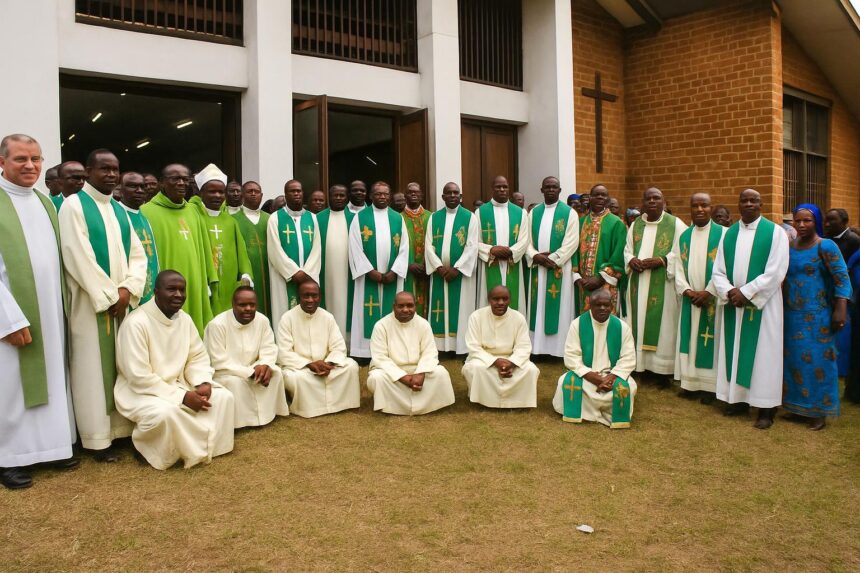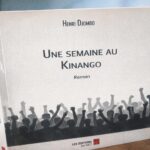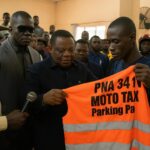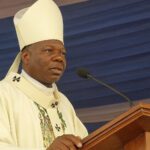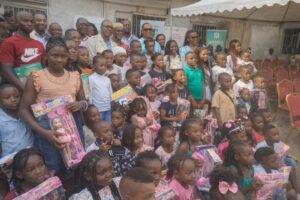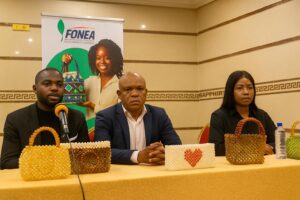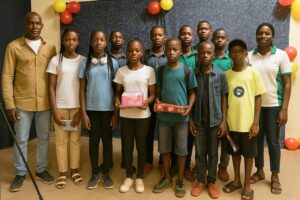Opening a Year of Mission
The ringing of bells in Saint-Jean-Baptiste church, Bouansa, set the tone for a vibrant Sunday 28 September. Bishop Daniel Mizonzo proclaimed the pastoral year 2025-2026 open, turning the quiet sugar-belt town of Nkayi into the spiritual spotlight of southern Congo-Brazzaville.
More than ceremony, the opening Mass crowned a week-long retreat at the Benedictine monastery of Sainte-Marie de la Bouenza, where forty priests, deacons and seminarians had prayed, sung and reflected in silence that locals respectfully call “la grande halte”.
A Week of Silent Renewal
Held from 21 to 28 September, the retreat unfolded behind weathered red-brick walls bordered by teak trees. Participants switched off phones, letting dawn chants and cicada songs frame days devoted to Liturgy of the Hours, Eucharist, and long personal meditation.
“It was a breathing space we all needed,” confided Father Yves Mabiala, chaplain at Loudima college, as his cassock dried in the breeze. “We reviewed the past year honestly and listened again to the Holy Spirit before returning to our crowded parishes.”
Lessons Grounded in Hope
Abbé Benjamin Samanou, visiting from Pointe-Noire, guided the sessions with extracts from Father Paulin Poucouta’s commentary on Luke. His core message linked the upcoming Jubilee Year to everyday struggles for water, transport and family stability in Bouenza and Lékoumou.
He urged pastors to “plant seeds of hope, not complaints”, reminding them that Pope Francis lists joy as the Church’s first service. According to the diocesan press office, the exchanges were frank, mixing laughter with hard data on catechism attendance and offertory trends.
Future Priests Prepare
While elders prayed, Father Pascal Taty from Brazzaville supervised eight final-year seminarians finishing two years of inter-cycle parish work. Their brief recollection explored celibacy, digital temptation and the art of listening in markets where parishioners often seek advice about rising food prices.
The highlight for them came on Sunday as Bishop Mizonzo welcomed their public request for ordination, clothing each in soutane and simple white alb. The congregation applauded, phones back on, capturing images already circulating on WhatsApp groups across Nkayi zone.
Joyful Opening Mass
Inside the packed nave, choir voices merged with balafon rhythms. During the rite of appointments, twenty priests received sealed envelopes confirming new posts, from forest parish of Zanaga to urban chaplaincies near the railway yards. Many smiled nervously, aware transfers often mean longer motorbike rides.
Bishop Mizonzo’s homily balanced theology and pragmatic counsel. Quoting Luke 4, he asked agents to ‘announce good news to the poor’ through projects like literacy circles, micro-credit groups or simply punctual Mass times, insisting creativity must serve communion, not competition among parishes.
Guiding Themes for 2025-2026
The diocesan theme “Sent to Heal and Reconcile” echoes Pope Francis’s call for a synodal Church. Pastoral letters released after Mass emphasise youth employment workshops, environmental clean-ups along the Niari River and strengthened child-protection protocols, aligning with national efforts to boost community resilience.
Father Richard Kihoulou, diocesan economist, later explained that each parish will earmark five percent of collections for social projects. “Talk of mission must include budgets,” he noted, adding that transparent boards will publish figures monthly to avoid rumours.
Mission Beyond the Monastery
After the final blessing, traffic thickened on the RN1 as minibuses carried clergy back toward Nkayi, Madingou and Sibiti. Inside, lively debates resumed: how to integrate TikTok evangelisation, how to accompany widows of timber workers, how to keep generators running amid fuel fluctuations.
Sister Mariette Mouasa, diocesan communication head, confirmed a new podcast will launch in November, delivering five-minute Gospel reflections in Kituba. “Many young people have earphones all day; if the Church wants to be heard, it must stream,” she laughed.
Community Reaction
Town market vendor Clarisse Banzila welcomed the initiatives. “Prices keep rising, but hope is free. If priests support small savings groups, that lifts everyone,” she said, arranging cassava leaves. Local administrator Léon-Paul Nkombo also praised the diocesan focus on civic responsibility.
A Record for Posterity
Immediately after Mass, chancery secretary Abbé Cellot Primat Nkounga Mabikas drafted the official procès-verbal, ink still drying beside the altar. The document lists every appointment, commitment and hymn, destined for diocesan archives that stretch back to 1959 colonial-era wp-signup.phps.
Archivist Brother Jean-Serge Bouanga explained that future historians often consult these files to trace demographic changes and track how local parishes responded to economic shocks. “We are writing more than Church history; we are writing regional memory,” he reflected.
Looking Ahead
As the sun dropped behind palm fronds, Bishop Mizonzo summed up the mood: “We leave renewed, ready to serve.” The diocese now carries that mandate into classrooms, clinics and dusty football pitches, determined to make the Gospel visible in daily Congolese life.
Service and Solidarity
Caritas Nkayi has already scheduled a mobile clinic tour for January, pairing nurses with catechists. Sponsorship comes from local businesses and diaspora associations in France, a sign of growing partnerships that mirror government appeals for stronger public-private action in health.
Observers note that such synergy between Church initiatives and civic programmes can amplify development goals without straining limited public budgets. By rooting projects in faith communities that people trust, organisers hope the new pastoral year will translate prayers into measurable social progress.

